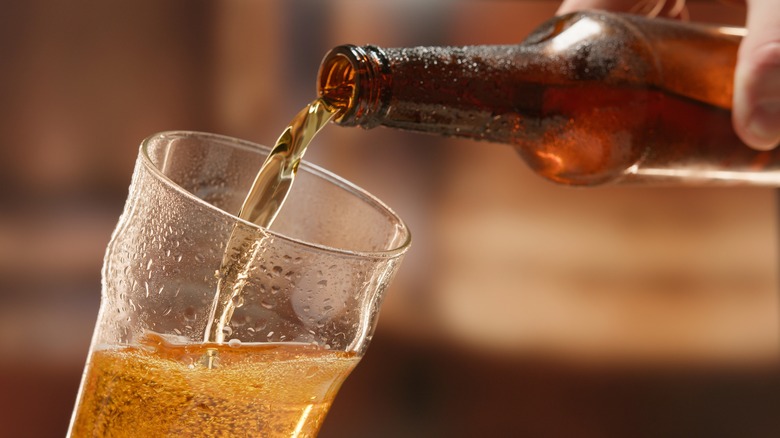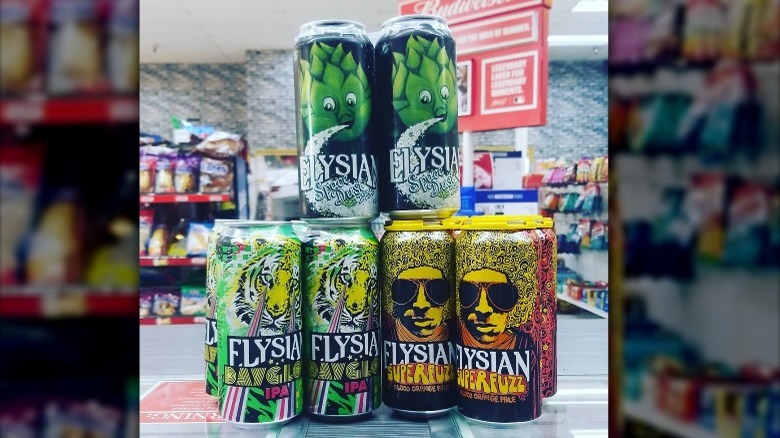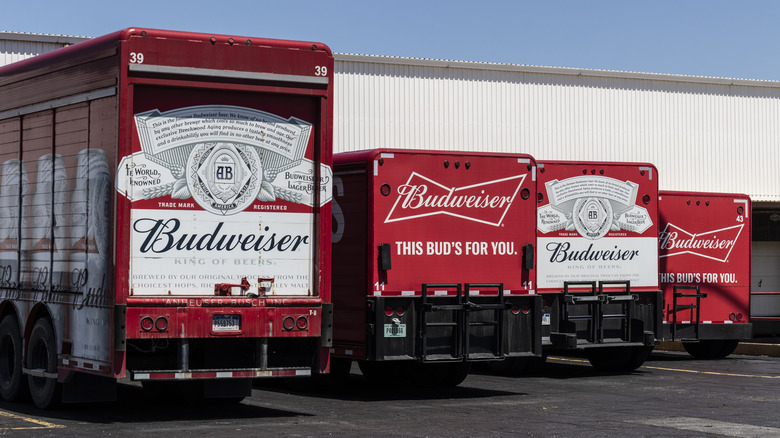The 'Craft' Beers That Are Actually Connected To Anheuser-Busch
A cold beer while you're grilling hamburgers for dinner just hits the spot, and America's love for craft beer means that many prefer to sip on a brew from their local brewery. According to Statista, there are currently over 9,000 craft breweries operating in the United States. The Brewer's Association characterizes a craft brewer as being small and independent. This means that they produce 6 million barrels of beer or less per year and that less than 25% of the brewery is owned by a beverage alcohol company that is not a craft brewer.
The best craft breweries are known for their innovation and willingness to create unique brews. They're often mainstays in local economies, and many people have a favorite craft brewery near their home. It comes as a surprise, then, to many people that many craft breweries are actually owned by larger companies.
Anheuser-Busch began purchasing stakes in smaller, craft breweries in the '90s, acquiring a portion of Redhook Ales in '94 followed by Widmer Brothers in '97, according to VinePair. However, when Anheuser-Busch was acquired by InBev to form the international and brewing company AB InBev in 2008, Anheuser-Busch became connected to many more small brewers.
So what beers are connected to Anheuser-Busch today? AB InBev currently owns a large number of craft breweries, which Anheuser-Busch calls partners on its website. These include Devils Backbone Brewing Company, Elysian Brewing, Four Peaks Brewing Co., Golden Road Brewing, Goose Island Beer Co., Karbach Brewing Company, Omission Balanced Brewing, Cisco Brewers, Wynwood Brewing, Veza Sur Brewing Co, Virtue Cider, and Wicked Weed Brewing.
Anheuser-Busch acquires craft beers, and AB Inbev acquires Anheuser-Busch
AB InBev is known for many popular and widely distributed beers, including Budweiser, Bud Light, Michelob Ultra, Stella Artois, Busch Beer, Natural Light, and Landshark Lager, to name a few. It began acquiring many of its current craft brewery partners in the 2010s, including Kona Brewing in 2010. The acquisition pushed AB InBev's ownership of the Craft Brew Alliance above 30%, which they would later fully acquire in 2020, according to Forbes. In 2011, AB Inbev bought out Goose Island Beer Co. (which they already owned 42% of) followed by Golden Road Brewing, Four Peaks Brewing Co., and Elysian Brewing in 2015.
The unique craft breweries add versatility to the international brewing company's lineup. For example, Wicked Weed Brewing is a newer brewery that was founded in 2012. Based out of Asheville, North Carolina, the brewery makes a variety of brews, including IPAs, sours, and stouts. The brewery is known for pushing the envelope with beers like its Freak of Nature double IPA and Milk & Cookies Imperial Stout. Another example, Goose Island Beer Co., strives to make beer more fun. It brews IPAs, pilsners, pale ales, and more. It sells beloved seasonal beers like Summertime Kölsch, Oktoberfest German Style Märzen, and Christmas IPA.
Why does AB Inbev own craft breweries?
Of course, owning more breweries allows AB InBev to make more profit. When larger companies acquire smaller craft breweries, it typically allows the smaller breweries to benefit from a larger distribution and reach more customers. On their 2015 acquisition, Golden Road Brewing says on their website, "With capabilities to brew on a larger scale, we partnered with Anheuser-Busch in 2015 to launch national distribution, bringing our craft beers to you!"
While there are benefits to larger companies acquiring smaller craft breweries, not everybody is a fan of the idea. In 2017, shortly after AB InBev acquired many of its craft breweries, a movement called Take Craft Back began that sought to stop the company from buying craft breweries. Many craft brewery enthusiasts fear that acquisitions and ownership by larger brands and companies like AB Inbev will make it increasingly difficult for smaller, independently-owned breweries to compete, and feel misled as many drinkers prioritize supporting independently owned breweries and large beer companies aren't always identified on the labels of the craft beers they acquire. Regardless of your stance, knowing which craft breweries are owned by larger corporations so you can make an informed decision on where you place your dollar when you buy your next six-pack.


